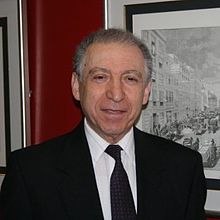Michael Szenberg
Appearance

Michael Szenberg (born 1934) is an American economic, and distinguished professor of economics and past Chairman of the Finance and Economics department at Pace University's Lubin School of Business.
Quotes
[edit]"Ten Ways to Know Paul A. Samuelson" (2006)
[edit]- Michael Szenberg, Lall Ramrattan and Aron Gottesman, "Ten Ways to Know Paul A. Samuelson" (2006)
- In the world of music, it is a rarity to find a person who is both a gifted composer and a top conductor. So it is in economics as well. Paul is that rarity. When Paul is writing, the sun is always out. His writing—ever eloquent, ever stirring—is done with the kind of verve that one seldom finds today.
- In other words, aggressiveness and selfishness are associated with superior performance by scientists. But my experiences and observations of eminent economists do not support these assertions. In Paul’s case, not only does he know how to maintain a balance between scholarship, family, and play, but he exhibits a high degree of humanity and kindness. The term mentsch aptly describes him.
- The Houses of Friedman and Samuelson disagreed on both methodology and policy. Nevertheless, the intellectual battles never encroached upon their personal respect for and friendship to each other.
- Samuelson clearly defined himself as a centrist, rather than an advocate of a right- or leftwing philosophy.
- Indeed, Paul’s capacity for irreverence and wit is true to the John Maynard Keynes maxim: "Words ought to be a little wild, for they are the assault of thoughts on the unthinking"
- Paul has no problem with wealth, yet he advocates positions that work against his personal economic interests. He notes that, while advocating the closing of tax loopholes, he has no difficulty taking advantage of those that remain. Fundamentally, Paul represents a middle path, as expressed in the ancient dictum that "men with vision walk in the middle."
- In contrast to the natural sciences, where Isaac Newton and Albert Einstein made their major contributions, most economics masterpieces were written when the authors were middle aged. Adam Smith, Karl Marx, John Maynard Keynes, and Milton Friedman come to mind. However, Paul started much earlier, in his 20s; and, even now, his new articles influence the fields of economics and finance.
- When Paul’s Foundations was published in the 1940s, readers experienced a kind of revelation that created a sensation. This brings to mind the post-WWI public’s similar reaction to Marcel Proust’s Remembrance of Things Past. Critics compared Proust’s prolific writings to those of Homer, Dante, and Shakespeare. But, what a difference in Proust’s and Paul’s dispositions!
- To rephrase what Cicero wrote of Socrates, Paul called down modern economics from the skies and implanted it in the universities throughout the world.
- What is amazing about Paul is that his life’s work continues even today. What trumpet player Clark Terry stated of Duke Ellington applies equally well to Paul.

